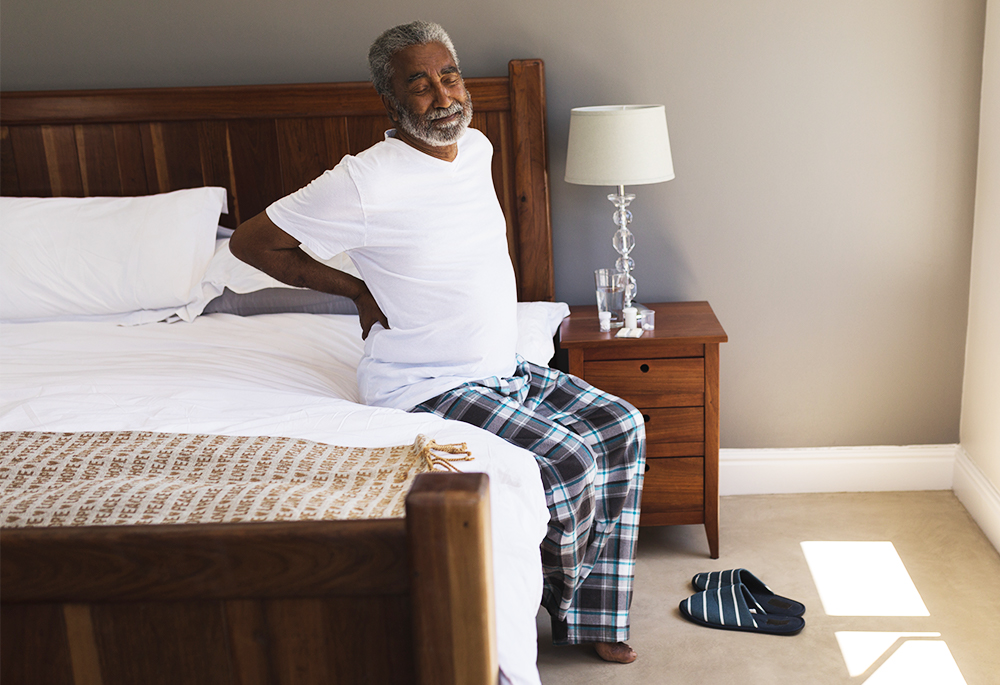Clinical Trial for Men With Osteoporosis Now Open for Volunteers

Posted in News Release | Tagged biomedical research, clinical trials, male osteoporosis
MEDIA CONTACT:
Karen Teber
km463@georgetown.edu
WASHINGTON (June 4, 2019) — Enrollment in a clinical trial testing a new treatment for men with osteoporosis is now open at Georgetown University Medical Center.
Osteoporosis is a systemic skeletal disease characterized by low bone mass and deterioration of bone tissue (brittle bones) that makes bones more fragile and likely to break. Although osteoporosis predominantly affects postmenopausal women, approximately 20 percent of men over the age of 50 will sustain an osteoporotic-related fracture in their lifetime.
“Most men experience bone loss with aging and low bone mineral density, which are risk factors for fractures or broken bones,” says the study leader at Georgetown, Andrea Singer, MD, FACP, associate professor of medicine.
The clinical trial underway now is testing the safety and efficacy of abaloparatide. It has been evaluated in a number of studies for its potential to treat osteoporosis, and has been approved in the United States for the treatment of women with postmenopausal osteoporosis at high fracture risk.
The present study, conducted by Georgetown University at MedStar Georgetown University Hospital, is investigating whether abaloparatide improves bone mineral density over the course of the study period.
The clinical study lasts one year and participation includes approximately nine office visits. The study will consist of a screening period, which may last up to eight weeks to determine eligibility.
Men ages 40 to 85 with osteoporosis are invited to volunteer in this phase III, randomized, double blinded, placebo-controlled study. Participants will be “randomized” into one of two study groups – one group will receive abaloparatide (injections) and the other group will receive a placebo (injections that look and feel exactly the same but contain no study medication). Randomization is done by a computer. Neither the volunteers nor the researchers will know what group participants are in (double blinded).
Based on information from similar clinical studies using abaloparatide, side effects included high calcium in urine, dizziness, headache, nausea and orthostatic hypotension. Other less common risks will be explained to each participant.
Up to 225 subjects at 35 study centers nationwide will take part in this study; approximately 10 subjects will participate at Georgetown. There are no study-related charges for the participants.
Radius Health is the sponsor of this study. MedStar Georgetown University Hospital is being paid by Radius Health to conduct this study. Singer occasionally serves as a paid lecturer and advisory board member for Radius Health. Learn more about this clinical trial at ClinicalTrials.gov. Men who are interested in volunteering for the clinical trial should call Sebastian Peña, at 202-444-7288 or email him at sebastian.pena@georgetown.edu.
About Georgetown University Medical Center
Georgetown University Medical Center (GUMC) is an internationally recognized academic health and science center with a four-part mission of research, teaching, service and patient care (through MedStar Health). GUMC’s mission is carried out with a strong emphasis on public service and a dedication to the Catholic, Jesuit principle of cura personalis — or “care of the whole person.” The Medical Center includes the School of Medicine and the School of Nursing & Health Studies, both nationally ranked; Georgetown Lombardi Comprehensive Cancer Center, designated as a comprehensive cancer center by the National Cancer Institute; and the Biomedical Graduate Research Organization, which accounts for the majority of externally funded research at GUMC including a Clinical and Translational Science Award from the National Institutes of Health. Connect with GUMC on Facebook (Facebook.com/GUMCUpdate) and Twitter (@gumedcenter).
